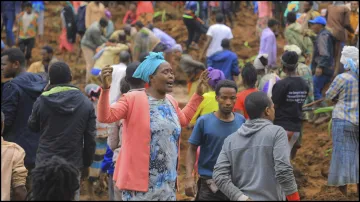Addis Ababa: The death count from two landslides in southern Ethiopia has risen to 229, with more feared dead as the search for survivors and casualties continued for a second day, according to a government official. The country had been battling heavy rains when a landslide buried people in the southern Gofa zone on Sunday, after which a second one occurred when people had gathered to help on Monday.
Footage shared by the local administration showed people digging up bodies with shovels and bare hands. "The devastation is huge and beyond our capacity. As a result, there are a lot of people who were uprooted from their livelihoods in the area. The area is now uninhabitable. We need to also work on relocating these people. We call upon all stakeholders, aid organisations, volunteers and the business community to lend their hand and stand with our community," said Markos Melese, head of the National Disaster Response agency in Gofa Zone.
Earlier reports said at least 157 people were killed in the remote area, including young children and pregnant women. The death toll rose from 55 late Monday to over 150 on Tuesday as search operations continued in the area, said Kassahun Abayneh, head of the Gofa Zone communications office. Gofa Zone is the administrative area where the mudslides occurred.
VIDEO: Ethiopia landslide casualties cross 200
Prime Minister Abiy Ahmed said he was deeply saddened by the terrible loss of life, and that federal officials had been deployed to reduce the impact of the disaster. "We stand in strong solidarity with the people and Government of Ethiopia as rescue efforts continue to find the missing and assist the displaced," said African Union chairperson Moussa Faki Mahamat.
The head of the World Health Organisation (WHO) Tedros Adhanom Ghebreyesus, who is Ethiopian, said he was thinking of all the families affected and that a WHO team had been sent to support immediate health needs. At least five people have been pulled alive from the mud, said Dagmawi Ayele, a local administrator.
Landslides are common during Ethiopia's rainy reason, which started in July and is expected to last until mid-September. "As the region continues to face the harsh impacts of climate change, we urge everyone to stay vigilant and follow safety protocols to protect lives and prevent further tragedies," said Workneh Gebeyehu, executive secretary of the Intergovernmental Authority on Development, a regional bloc.
(with inputs from agencies)
ALSO READ | Ethiopia Horror: Powerful landslide kills 157, families wiped out, children seen hugging corpses | VIDEO
Latest World News
